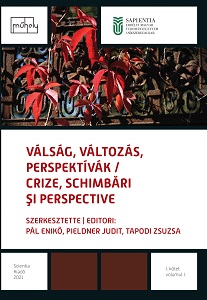EGYÉNI ÉS KOLLEKTÍV TRAUMÁK TOMPA ANDREA REGÉNYEIBEN
PERSONAL AND COLLECTIVE TRAUMAS IN ANDREA TOMPA’S NOVELS
Author(s): Zsuzsa Tapodi
Subject(s): Hungarian Literature
Published by: Scientia Kiadó
Keywords: personal and collective traumas; narrative voice; minority existence; dictatorship;
Summary/Abstract: The novels of Andrea Tompa, a writer born in Cluj-Napoca, depict the turning events of the recent past in Transylvania. The story of the autobiographical novel A hóhér háza. Történetek az aranykorból [The Hangman’s House. Stories from the Golden Age] (2010) presents the last stage of the communist dictatorship. The novel Fejtől s lábtól. Kettő orvos Erdélyben [Head to Feet. Two Doctors in Transylvania] (2013) describes the first decades of the 20th century, and Omerta. Hallgatások könyve [Omerta. The Book of Silences] (2017) depicts the atmosphere of the fifties. The last work, entitled Haza [Home] (2020), is focused on migration processes presented with the help of various narrators. This essay examines the personal and collective traumas depicted in the works, the system of how the heroes were reduced to silence, and their attempts to escape.
Book: Válság, változás, perspektívák / Crize, Schimbări şi Perspective
- Page Range: 109-121
- Page Count: 13
- Publication Year: 2021
- Language: Hungarian
- Content File-PDF

